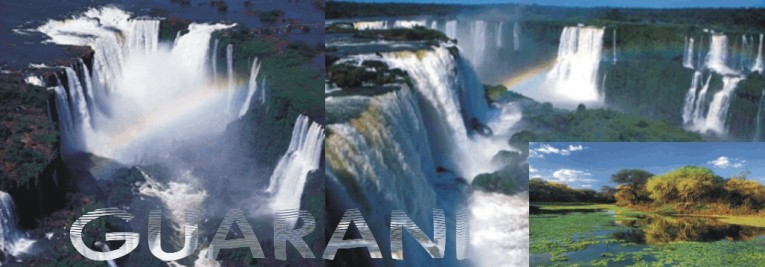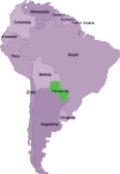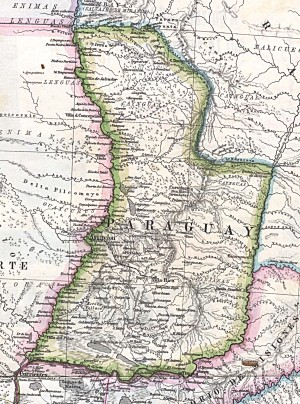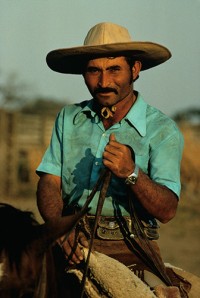|
Languages of the World KENAX Translation Agency | |
 |
| TRANSLATION RESOURCES | TRANSLATION TIPS | TRANSLATION JOBS | TRANSLATION SERVICE |
Language of Guarani, Jobs and EmploymentThis webpage was created to help people speaking Guarani find work. Below are some weblinks to help you find work in your local area. If you know of any others, please feel free to suggest them to us so that we can add them to these pages. |
|
Otherwise, you can also work remotely from the comfort of your home by providing translations or other remote human resource work. If you would be interested in working from the comfort of your home, please fill in our quick application form to the right. | 
| |
Guarani Web Links Related to Jobs, Employment, Translations and Other
|
|
Language family: Indo-EuropeanTocharian - now extinct At around 3000BC there were three ethnic populations dominating in South America: the Andeans in the west, the Arawaks in the north, and the Tupi-Guarani, who probably had a greater population than the other two and who had great territorial extension. Apparently the Tupi-Guarani had emigrated from Central America, the Tupis continuing eastward and north up the Amazon, where they further developed the Tupis branch of the language. The Guaranis, on the other hand, migrated further west and southward, occupying the river valleys of Parana, Paraguay and Uruguay. Since the two groups covered a great expanse of area, hundreds of dialects emerged among them, forming the overall Tupi-Guarani language family. Considering their semi-nomadic lifestyle, unlike other ethnic groups on the continent, such as the Aztecs and Incas, the Tupi-Guaranis did not leave behind them any temples, palaces or statues. |

| |

|
Because of horrible persecution by the Portuguese, the Tupis branch of the language died out, most notably in the southern and eastern portions of Brazil, but surviving to some degree in the Amazonia. Guarani, on the other hand, lived on strong in what is presently Paraguay, and in the border regions of surrounding countries such as Bolivia, Argentina and Brazil. Democracy existed in ancient Guarani culture, whereby the caciques were chosen by votes, which they won by expressive oratory displays, perhaps leading to the language's poetic development. The Guarani sought immortality on earth through an enlightenment from local flora, perhaps one of the reasons for their nomadic nature - always in search of botanical wealth and enlightenment (this immortality, or aguyje, referred to as "state of eternal perfection"). Traversing such great distances gave them the opportunity to study many species of flora and their medicinal qualities. Once the Europeans came, they imparted to them their great knowledge of botany, making Guarani third in the world, after Greek and Latin, in terms of the etymological origin of scientific names for plants. They also gave us such words as cougar and jaguar. Guarani was as important to South America as Latin was for Europe and lasted up to the time of the Incas. It was exclusively an oratory language, meaning it did not take written form and was handed down the generations through verbal form only. While the Tunis became dominated by the Portuguese, the Guarani were overrun by the Spaniards, who were seeking to conquer the wealth of the Inca, who were located in what is now Peru. | |
|
Because of their agrarian society the Guarani were generally quite hospitable, but would often mention the word guarini, meaning war, around the Spaniards, and hence the name which was attributed to them. The Spaniards aimed to use the Guarani as mediators in order to communicate with the Inca, so they tried to teach them Spanish. As proof of friendship the Guarani offered the Spaniards their daughters, where each Spaniard took several of them since they travelled the great expanse of the ocean without their female counterpart. This gave birth to the cross-breed Mestizos, who learned Spanish from their father but learned Guarani orally from their mothers. In this way the language of Guarani gained increasing importance, as a means for the Spanish to reach the Incas, while the Guarani maintained an increasingly passive existence, their agricultural industry promoted by the conquerors. Over time laws and other important matters were translated into Guarani, using the Spanish alphabet in an attempt to describe the language. Later, the Fransiscans and then Jesuit philologists helped develop the written language further, as they chose it as the language with which to "civilise the savage beasts" of the continent. |
|
The Jesuits contributed greatly to the survival of this language, putting together Guarani-Spanish dictionaries, grammatical compendiums and other important literature. Over a period of 160 years they consolidated several dialects into a single language and even spread it to much of Brazil, although it faded there under Portuguese pressure (who soon expelled the Jesuits). In any case, all these teachings gave the Guarani a sense of pride which the Spanish crown also felt threatened by, to the point that they eventually expelled the Jesuits from their region as well. But the wheels were set in motion and the indigenous population continued the work of the Jesuits, until the province of Paraguay eventually attained autonomy. Guarani is now spoken by 7 million speakers in Argentina, Bolivia, Brazil and Paraguay, and is the official language of Paraguay and Mercosur. It is an indigenous language of South America and spoken by 94% of Paraguayans as well as inhabitants near its borders in surrounding Argentina (where it is an official language in two of its provinces), Bolivia and Brazil. It is the only indigenous language of the Americas which has survived on this level and not overtaken by such imports as Spanish or Brazilian, and whose majority speakers now are not indigenous. A famous Jesuit priest labelled the language as "copious and elegant on the level of the most famous languages", and the national soccer team of Paraguay likes to use it during games to confuse their opponents. |

| |
|
But because Spanish is an equal and official language of Paraguay, no one tends to speak either of them in their pure forms, but rather as some combination of the two, the mixture depending on their social class and racial origin (the more educated and European descendants speaking more Spanish, while the poorer and indigenous descendants speak more Guarani - the combination referred to as Jopara).
Like this content? Please support it by pressing any or all of these links below: Copyright © KENAX, by Karel Kosman - All Rights Reserved Worldwide. |
| KENAX Translation Agency | |
